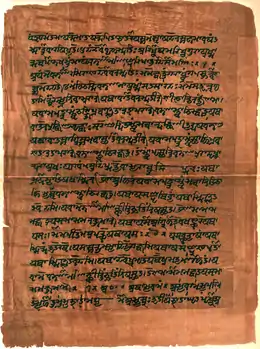Atharvan
Atharvan (अथर्वन्, atharvan-; an n-stem with nominative singular अथर्वा atharvā) was a legendary Vedic sage (rishi) of Hinduism who along with Angiras is supposed to have authored ("heard") the Atharvaveda. He is also said to have first instituted the fire-sacrifice or yagna. Sometimes he is also reckoned among the seven seers or Saptarishi. His clan is known as the Atharvanas. Atharvan married Shanti, daughter of Kardama rishi, and had a great sage Dadhichi as a son. He was referred to as a member of the Bhrigu clan.
| Atharvan | |
|---|---|
 Atharva Veda written by Atharvan | |
| In-universe information | |
| Family | Brahma (father) |
| Children | Dadhichi |
According to mundaka upanishad and other texts, he was eldest son and (Manasputra) born from mind of the Brahma. Vedic atharvan is cognate with Avestan āθrauuan / aθaurun, "priest", but the etymology of the term is not yet conclusively established. It was once thought to be etymologically related to the Avestan ātar, but that is now considered unlikely (Boyce, 2002:16). It has been suggested by scholars that the Vedic and Avestan terms are not of Indo-European origin, and are derived from the BMAC substrate.
See also
- Vedic priesthood
- Chatterji: The Hymns of Atharvan Zarathushtra (1967) by Jatindra Mohan Chatterji.
[avesta.org/chatterj_opf_files/slideshow.htm]
References
- Boyce, Mary (2002). "Āθravan". Encyclopaedia Iranica. New York: Mazda Pub. pp. 16–17.
- Witzel, Michael (2003) Linguistic Evidence for Cultural Exchange in Prehistoric Western Central Asia (Sino-Platonic Papers; 129), Philadelphia: University of Pennsylvania, Department of East Asian Languages and Civilizations
- Lubotsky, Alexander (1999) , “The Indo-Iranian substratum”, in Early Contacts between Uralic and Indo-European: Linguistic and Archaeological Considerations, Helsinki

